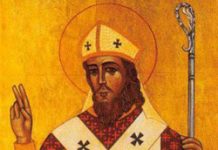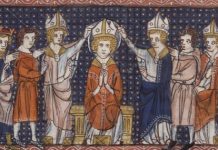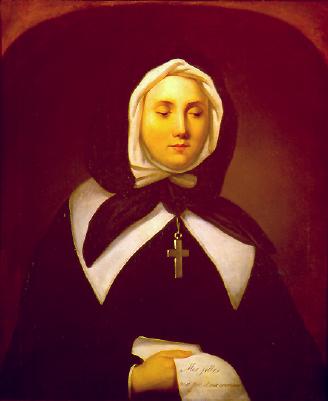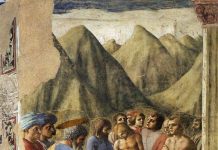I returned from Rome late last night, around about midnight – at least, all the way back home, which required an hour’s walk through the city, to catch the bus to the airport (on the coast, near some lovely beaches, seen when airborne); then a nine-hour flight to Toronto; an hour lay-over; a connecting flight to Ottawa, delayed since the intended runway was closed; it was curious watching the held-up planes take off in sequence, waiting for each to have safely taken off before another goes, like children on a waterslide; then the 45 minute flight to the nation’s capital, after which I was picked up by a charitable alumnus engaged to be married to an alumna who happens to be working in the town in which I live, so he had ulterior motives in getting there; then, well, home. There, and back again, as Tolkien might, and did, put it.
I will say that it is disconcerting to attend Mass in Saint Peter’s basilica in the morning, and be back in one’s home country the same day, even with a flight at 2:30 in the afternoon, with a journey that until well into the twentieth century would have taken weeks. The six-hour time difference helps. But, of course, more so modern air travel: The airplane was flying at well over 800 km/n, or 500 mph. To ponder a vehicle moving that fast near the ground would be truly awesome, creating a hurricane-level wind shear that would rattle homes and break windows. I tried to calculate the weight of the aircraft, with all the people on board. There were at least fifty rows of seats, five seats per row, along with all their luggage. Then there’s the plane itself. We take such power and technology for granted, but perhaps we shouldn’t. It is in many ways a gift, allowing so many to see so much of God’s good and great world. How long that gift lasts, no one knows. So, Deo gratias, for Man’s quasi-divine know-how.
I will allow my thoughts to sift and jet lag to lift before writing of my final few days in Rome. Only to say for now that they were the most difficult of the pilgrimage, so perhaps the most grace-filled. I know not, my own meagre prayers weighed down by my sins.
For now, by one of those quirks of providence, today is the anniversary – if so it be termed – of the great fire of Rome in 64 A.D., for which Nero blamed the Christians, giving him justification for their mass slaughter and the beginning of the persecutions, which would last on and of for centuries, until Constantine. Nero also used this event to rebuild the city in the image he wanted, but it has been ‘re-built’ so many times, and, with all the universal construction and excavation still underway, the rebuilding of Rome has never stopped.
Today is also the anniversary of the last great fire in New York in 1845, which killed 30 people and destroyed 345 buildings, making it far less destructive than its Roman predecessor. And killed far fewer people than 9-11.
More destructive still was the Franco-Prussian war, which began officially on this day in 1870, and was the dispositive cause for the loss of the papal states. The French troops guarding the Pope’s sovereign power over a swath of Italy had to depart forthwith, leaving the territory open to the Italian revolutionaries, who poured into its borders. They left the Vatican itself intact, and, after a token resistance, the Pope declared himself a ‘prisoner’ therein (even though he was offered a generous pension, Pius IX refused). The conflict was finally resolved on February 11th, in 1929, by of all people Mussolini, who signed the Lateran Treaty with Pius XI, creating the Vatican city-state as we now know it, right in the heart of Rome. More to say on that, perhaps, in that reflection.
And, finally, in these meanderings, today is the anniversary of Chappaquiddick, when Senator Ted Kennedy crashed his car off a bridge into Poucha Pond. He escaped the overturned vehicle, and returned home overnight, leaving his date, Mary Jo Kopechne, to drown to death. How his political career survived that debacle is a mystery. More mysterious still is how God might see that choice, along with Mr. Kennedy’s later public support for just about every aspect of the culture of death. Miserere ei, Domine.
The decisions we make determine the course of our lives, one way, or the other.










